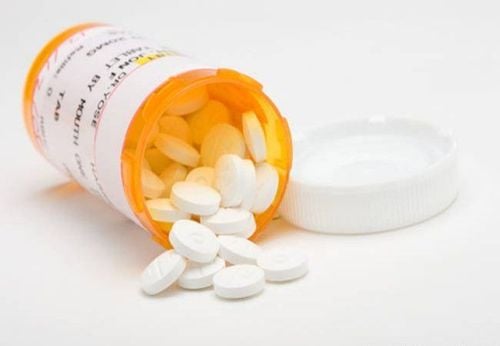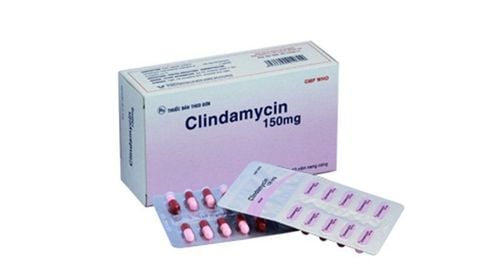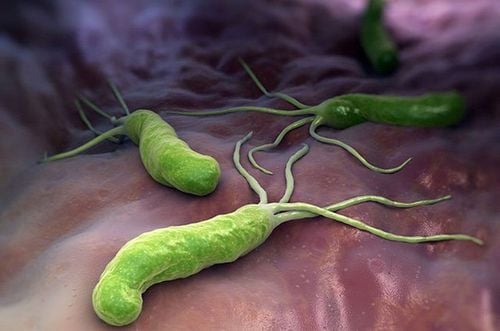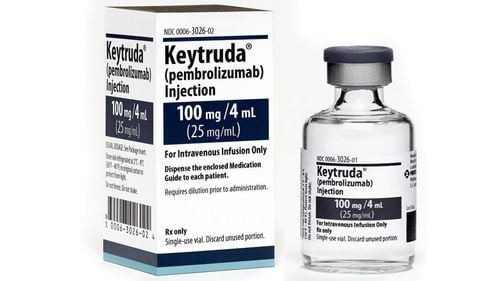This is an automatically translated article.
Taxewell drug has the main ingredient Docetaxel which belongs to the group of anti-cancer drugs and affects the immune system. The following is information about the uses, dosage and precautions when using Taxewell medicine.
1. What are the uses of Taxewell?
What are the uses of Taxewell? Taxewell drug has the main ingredient Docetaxel (in the form of Docetaxel Trihydrate) 80mg/2ml, prepared in the form of a concentrated solution for intravenous infusion, packaged in the form of a box of 1 vial of drug solution and 1 vial of solution. dilution lips.
Taxewell drug is indicated for treatment in the following cases:
Treatment of breast cancer:
Docetaxel is indicated for the treatment of patients with locally advanced breast cancer or metastatic breast cancer after ventricular treatment failed with previous chemotherapy. Docetaxel in combination with doxorubicin and cyclophospjamide is indicated for adjunctive therapy in patients with operable lymph node-positive breast cancer. Treatment of non-small cell lung cancer:
Docetaxel is used as monotherapy in the treatment of patients with locally advanced or metastatic lung cancer, after failure of previous platinum chemotherapy. Docetaxel in combination with cisplatin is indicated for the treatment of patients with inoperable, locally advanced or metastatic non-small cell lung cancer who have not received prior chemotherapy. Prostate Cancer Treatment
Docetaxel in combination with prednisone is indicated for the treatment of patients with metastatic non-androgen-dependent (hormone-resistant) prostate cancer. Docetaxel in combination with cisplatin and fluorouracil is indicated for the treatment of patients with advanced gastric adenocarcinoma, including gastric junction adenocarcinoma. - oesophagitis, not receiving prior chemotherapy as the disease progresses. Treatment of head and neck cancer:
Docetaxel in combination with cisplatin and fluorouracil is indicated for the treatment of patients with locally advanced squamous cell carcinoma of the head and neck (SCCHN).
2. Dosage and how to use Taxewell
2.1.Dosage For Breast Cancer
For locally advanced or metastatic breast cancer after previous ventricular chemotherapy, the recommended dose of Docetaxel is 60mg/m2 - 100mg/m2 infusion intravenously for 1 hour every 3 weeks. For the adjuvant therapy of operable lymph node-positive breast cancer, the recommended dose of docetaxel is 75 mg/m2, 1 hour after doxorubicin at 50 mg/m2 and cyclophosphamide 500 mg/m2 every 3 weeks for 6 courses. Prophylactic G-CSF can be used to minimize the risk of hematologic toxicity. For the treatment of non-small cell lung cancer (NSCLC)
For treatment after failure of previous platinum chemotherapy, Docetaxel is used as monotherapy, the recommended dose is 75 mg/m2 IV over 1 hour every 3 weeks. In chemotherapy-experienced patients, a dose of 100 mg/m2 was associated with increased hematologic toxicity, infection, and some treatment-related mortality in randomized controlled clinical trials. When used in combination with cisplatin, the recommended dose of Docetaxel is 75 mg/m2 intravenously over 1 hour, immediately followed by cisplatin 75 mg/m2 over 30-60 minutes every 3 weeks. For the treatment of prostate cancer
For hormone-resistant prostate cancer that has metastasized, the recommended dose of Docetaxel is 75 mg/m2 every 3 weeks, by intravenous infusion over 1 hour and taken orally with Prednisone 5 mg 2 times everyday.
For gastric adenocarcinoma
For gastric adenocarcinoma, the recommended dose of Docetaxel is 75 mg/m2 intravenously 1 hour, followed by cisplatin 75 mg/m2 IV infusion 1 hour (using both on day 1), then fluorouracil 750 mg/m2/day as a continuous intravenous infusion 24 hours/day for 5 days, starting from the end of the cisplatin infusion. Treatment is repeated every 3 weeks. Patients should be given appropriate antiemetics and rehydration prior to infusion of cisplatin.
For head and neck cancer (SCCHN)
The patient must be given appropriate antiemetics and rehydration (before and after cisplatin infusion). Should prevent infection with neutropenia. All patients treated with Docetaxel, in the TAX323 and TX324, received prophylactic antibiotics.
Induced chemotherapy followed by radiation therapy (TAX323): For induction chemotherapy in patients with locally inoperable SCCHN, the recommended dose of Docetaxel in Taxewell is 75 mg/m2 IV infusion 1 hour, then IV infusion of cisplatin 75 mg/m2 over 1 hour on the first day, followed by a continuous intravenous infusion of fluorouracil 750 mg/m2/day for 5 days. Repeat every 3 weeks for 4 batches. After chemotherapy, the patient will receive radiation therapy.
Induced chemotherapy followed by radiation therapy (TAX324): For induction chemotherapy in patients with locally advanced SCCHN (inoperable, less likely to save life by surgery or to preserve organs), the dose is The recommended docetaxel in Taxewell is 75 mg/m2 IV 1 hour followed by cisplatin 100 mg/m2 over 30 minutes to 3 hours on the first day, then a continuous intravenous infusion of fluorouracil 1000 mg/m2/day from day 1 to day 4. Repeat every 3 weeks for 3 batches. After chemotherapy, the patient will receive chemo-radiotherapy at the same time.
2.2. How to use Taxewell is used through an intravenous line.
3. Pay attention to the use of Taxewell drugs
3.1.Contraindications Contraindicated to use Taxewell in the following cases:
The drug must not be used by people who are hypersensitive to any of the ingredients in the drug; Do not use in patients with a neutrophil count less than 1500/mm2. Do not use with pregnant women; Do not use with women who are breastfeeding; Do not use in patients with severe liver failure. 3.2. Side effects The most common side effects when using Docetaxel are infection, neutropenia, anemia. When having neutropenia, the patient has symptoms of fever, hypersensitivity, thrombocytopenia, neurological disease, taste disturbance, shortness of breath, difficulty in defecation, loss of appetite, sea level rise of fingernails.
Besides, patients also experienced side effects with recognizable signs of water retention, weakness, pain, nausea or vomiting, bowel movements, mucositis, hair loss, skin reactions, and muscle pain. .
If in the process of using the drug, the patient encounters any signs that affect his health, he should immediately notify the doctor.
3.3.Caution Care should be taken when using Taxewell in the following cases:
Taxewell should be used with extreme caution in pregnant or lactating women. For the ability to drive and use machines: The drug can cause dizziness and ataxia, so it should be used with caution in people who have to drive and operate machines. People over 65 years old should consult their doctor carefully before using the drug. The medicine should be kept out of the reach of children. 3.4. Drug interactions Drug interactions that occur are more likely to decrease the effectiveness of a drug or increase the risk of side effects. In case the patient has to take more than one medication at the same time, it is necessary to consult carefully with the doctor.
Taxewell drug has the main ingredient Docetaxel which belongs to the group of anti-cancer drugs and affects the immune system. To ensure effective treatment, as well as avoid unwanted side effects, patients need to strictly follow the instructions of the doctor and medical staff.
Follow Vinmec International General Hospital website to get more health, nutrition and beauty information to protect the health of yourself and your loved ones in your family.
Please dial HOTLINE for more information or register for an appointment HERE. Download MyVinmec app to make appointments faster and to manage your bookings easily.













